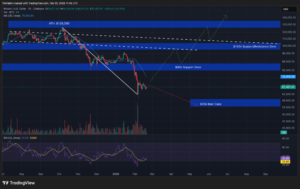Last updated:
 Why Trust Cryptonews
Why Trust Cryptonews

Billionaire investor Mark Cuban recently stated that the collapse of FTX could have been avoided if the U.S. had followed Japan’s regulatory framework for cryptocurrency. Speaking during an interview with Rug Radio, Cuban emphasized that U.S. Securities and Exchange Commission (SEC) Chair Gary Gensler’s enforcement-heavy approach has failed to provide clear guidelines for crypto businesses.
He suggested that Japan’s regulations, which require crypto firms to collateralize digital assets held on behalf of customers, would have prevented FTX and other failures like Three Arrows Capital.
Japan’s Financial Services Agency (FSA) regulations are part of the Payment Services Act and Financial Instruments and Exchange Act, which have been in effect since 2017.
The framework mandates that exchanges separate customer assets from their own and maintain sufficient reserves to protect investors in the event of insolvency or operational failures.
Cuban argued that a similar framework in the U.S. would have forced companies like FTX to safeguard user funds, potentially avoiding a financial catastrophe.
“What I said was, ‘Look at FTX US and FTX Japan.’ I said, ‘If Gary Gensler would have done just what they did in Japan—FTX, Three Arrows Capital— none of them would have gone out of business,’” Cuban stated. The SEC has not yet responded to Cuban’s remarks.
Political Implications of Mark Cuban’s Criticism
Cuban’s comments come at a time of heightened political tension surrounding cryptocurrency regulations. The discussion is heating up as the U.S. gears up for the upcoming elections. While former President Donald Trump has positioned himself as a pro-crypto candidate, promising to make the U.S. the “crypto capital of the planet,” Vice President Kamala Harris has been less forthcoming about her stance on the issue.
Cuban’s interaction with Harris’ team suggests there may be some willingness to re-examine current regulations and prevent similar debacles in the future.
Cuban also revealed that Harris’ advisors have shown interest in shoring up regulations. In July, he noted receiving multiple questions from her camp regarding crypto, which he saw as a positive indication of future policy changes.
Lessons from FTX and the Road Ahead
In response to FTX’s collapse, Cuban recommends that the U.S. learn from Japan’s regulatory successes. He believes that implementing stricter rules requiring crypto firms to segregate and secure user funds could protect investors and stabilize the industry.
As the U.S. moves forward, the conversation around stronger regulations may influence the broader global crypto landscape.
Key Insights:
- Mark Cuban argues that U.S. adoption of Japan’s crypto regulations could have prevented FTX’s collapse.
- Political tensions on crypto policies intensify ahead of the U.S. elections, with differing views from Trump and Harris.
- Cuban sees potential in stronger regulations to protect investors and stabilize the U.S. crypto market.
Disclaimer: Crypto is a high-risk asset class. This article is provided for informational purposes and does not constitute investment advice. You could lose all of your capital.
















